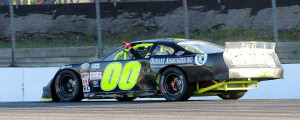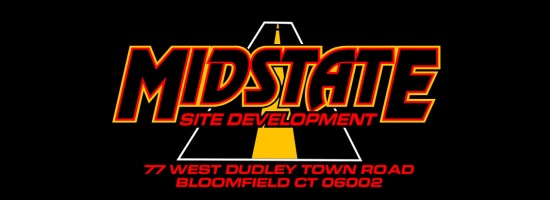
—
It’s Thursday again… Time to open the garage door, dust off the ol’ Mini Stock and take it for a test spin around the cul de sac at the end of the street…
 I’M GUESSING NEITHER Travis Benjamin nor Mike Rowe are off to the starts they thought they’d enjoy to their respective Pro All Stars Series seasons.
I’M GUESSING NEITHER Travis Benjamin nor Mike Rowe are off to the starts they thought they’d enjoy to their respective Pro All Stars Series seasons.
Both are former series champions in championship-winning equipment, but they’ve already seen struggles. Benjamin, driving the Petit Motorsports car that Rowe won the 2015 PASS North Series title in, was involved in a qualifying wreck and Thompson Speedway Motorsports Park and never made the starting grid for the series opener. Rowe got clipped on the backstretch early in said season-opening Icebreaker 75 and was saddled with a DNF in that event.
Rowe rallied a bit two weeks ago at Oxford to finish fifth driving for Richard Moody Racing, but Benjamin finished 22nd in that race. The two drivers sit 10th and 14th, respectively, in the early season PASS standings with the notoriously finicky Beech Ridge Motor Speedway on the schedule this Saturday.
Beech Ridge isn’t the type of track where you hear drivers say, “That’s where we can turn our season around.” Rowe, though, has won the PASS 300 there on multiple occasions, clinched his 2015 title there in the 300 last September and owns two NASCAR Whelen All-American Series championships at the track. Benjamin, for his part, has never won at Beech Ridge.
SPEAKING OF WINNING at Beech Ridge, Bryan Kruczek of Newmarket, New Hampshire, scored his first career PASS win in the Southern Maine Chrysler Dodge Jeep 150 a year ago, and he’s shown early speed again this season.
But, Kruczek’s PASS career — until last season when he broke out a new Dale Shaw Race Cars No. 00 — has been marked by speed early in races before being beset by misfortune in the second half of events.
At Oxford, he drove to the front, was punted out of the lead in the middle stages by TJ Brackett (who was penalized by race officials for the move) and rallied back to challenge for the lead again.
As for what happened after that? Well, you can relive all of that thrilling chaos here…
 AND SPEAKING OF winning at Beech Ridge (part two), the track has produced 11 different winners in the past 11 races at the track dating back to the 2012 season.
AND SPEAKING OF winning at Beech Ridge (part two), the track has produced 11 different winners in the past 11 races at the track dating back to the 2012 season.
In reverse order, Kruczek, David Oliver, Johnny Clark, Mike Rowe, Joey Doiron, Derek Ramstrom, DJ Shaw, Cassius Clark, Austin Theriault, Ben Rowe and Scott Dragon have lined up to win those 11 races.
THE AGE-OLD debate over which is more important, equipment or driver, never ceases to gain traction. The American-Canadian Tour NH Governor’s Cup 150 last weekend at Lee USA Speedway might have penned the latest chapter in this book, too.
Scott Payea of Milton, Vermont, returned to full-time competition this season for the first time in seven years and needed only one tune-up race before hitting up victory lane. Payea joined RPM Motorsports and it looked like the multi-time championship No. 37 Dodge hasn’t skipped a beat without ACT’s all time winningest driver, Brian Hoar, behind the wheel.
Payea was twice previously a serious championship contender in the ACT Late Model ranks with his family-owned team. Rick Paya’s RPM team… Well, their resume speaks for itself with more than 40 wins.
The question heading into this season was obvious: Can Payea just hop into the seat and contend for wins the way Hoar did every single week on the tour?
The answer last weekend seems just as obvious now: Yep. Pretty much.
THE ACT TOUR has its third race of the season on Sunday at the series’ hub, Thunder Road International Speedbowl in Barre, Vermont, with the Merchants Bank 150.
Unsurprisingly, given that Thunder Road gave birth to the current crate engine Late Model package ACT utilizes, the quarter-mile presents some of the tour’s most compelling races year after year.
 I POSED THIS theory to a couple of owners and drivers at Oxford a couple of weeks ago: Winning the ACT championship isn’t as much about performance as it is about survival.
I POSED THIS theory to a couple of owners and drivers at Oxford a couple of weeks ago: Winning the ACT championship isn’t as much about performance as it is about survival.
It sounds trite when you say it like that, but stay with me. There are only a half dozen teams or so in the ACT ranks that are going to run every single race this season; this is, after all, a tour that was founded on the notion that you can run an entire series with some full-time teams and a handful of weekly teams joining the races when ACT visits their respective home tracks. It’s a philosophy that has served ACT well — car counts have been well over 30 for each of this year’s first two races, and you can certainly expect that trend to continue at Thunder Road.
So if you take those six, seven or eight teams that will run all the races, it’s not as simple as “We need to post an average finish of (blank) to win the championship.” All you really need to do is race the half-dozen other teams that will be at every race on the schedule.
For the record, I think this is a good thing, though I’m sure the naysayers will point out otherwise. If you finish 20th in a race at White Mountain Motorsports Park, it’s not the end of your season. In fact, you could argue that racing for wins — taking risk vs. reward to an extreme — won’t hurt you as much as you might think in the championship picture.
Take PASS, for comparison’s sake, where Benjamin’s DNS or Mike Rowe’s 25th place finish at Thompson could have already derailed any championship hopes for those teams. With at least 12 teams clearly on the docket to race the entire schedule, it’s an uphill climb to — to say the least — to get back into title contention. A bunch of those teams could run into their own obstacles at some point, but the odds of all of them meeting catastrophe in one race or another are real longshots.
NEWS FLASH: GLEN Luce is pretty good at Oxford Plains Speedway.
The reigning Oxford 250 champion won the first 50-lap feature of the season at the track last Sunday afternoon.
Interesting note on Oxford: The track has done away with handicapping the field prior to the start of heat races for their weekly program. It’s a straight up draw for your starting spot in your heat, and where you finish in your heat is where you start the feature.
It’s a good move that will surely shake things up in the championship race by season’s end.
AND, FINALLY, IN sticking with tradition…
Try the cuban sandwiches, and don’t forget to tip your waitress. You’ve been a great audience. The Foo Fighters are here, so stick around.



















On the ACT Tour, your starting spot is more important than either the equipment or driver. That’s why the ACT Tour doesn’t handicap high point cars.
…and while we are on the topic of the ACT Tour – lets dispell the myth it’s about track regulars vs tour teams. Any series that only has a half dozen teams following it is weak. That hasn’t always been the case of the ACT Tour, just the last 4 years or so. The fact is most of the teams running at least half of the tour races are not weekly racers, but tour racers who just run the series part time.
The decline of the ACT Tour is sad to see, no matter how you try to spin it.
ANDY, any tour that attracts over 30 cars for each of its first two races has to be doing something right, agree?
Maybe that’s the way racing is going, not everybody going to every race. Pure economics.
I think at T Road, Waterford ,Thompson ,Seekonk and 51 you’ll see a lot of the regular weekly racers trying to get in the show. Lee and Oxford don’t run an ACT late model division.
They run heats, that draw for starting spots, and set the field depending on how many cars you pass in your heat. You are thinking of the WMT, 2 on pole, 01 shotgun every week.
No, the way the ACT Tour sets the starting position, the fast cars start up front, just as if they were running time trials. Check the records, the majority of ACT Tour races are won from starting positions 1 – 10 (Lee was won from 3rd), just like a time trial race would be. And don’t think those heat races promote a lot of passing, not when everyone now makes the show and it usually only takes a +3 or so to earn an up front starting position.
The ACT Tour used to average over 40 cars per race, with over 15 teams high quality teams running for the championship, now they are down to barely 30 cars (and will likely average under 30 for the season). Now they might have 6 or 7 teams run full time.
And how is running ACT rules for weekly tracks going?
Out of all the tracks that run ACT Late Models weekly (or semi-weekly), how many of those places average at least 15 cars?
We are talking about WMMP, Speedway 51, Seekonk, Waterford, Thunder Road, Devil’s Bowl, Claremont (where the division is on life support and likely gone after this season).
Out of those 7 tracks, only 1 averaged more than 15 cars per week in 2015. Not to mention that ACT Late Models used to run weekly at both Lee and Oxford, but the class was dropped for two reasons:
a) lack of cars
b) poor quality of racing – the spec rules, and 8″ tires made starting positions more important than anything else.
The ACT rules package has watered-down the racing so badly that ACT itself has had to reconfigure their handicap system for the weekly shows at Thunder Road. High point cars haven’t started in the rear of weekly events for years, instead the track runs a system where the top point cars are starting in the 8th, 9th or 10th positions.
Just more conceding to the lack of passing and real racing the ACT rules package stifles.